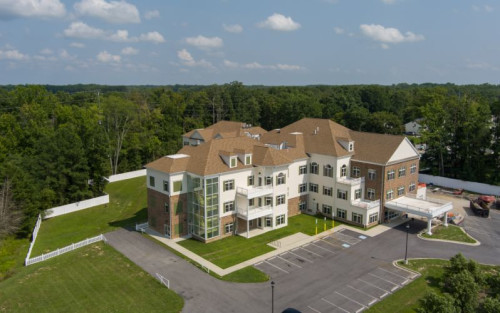
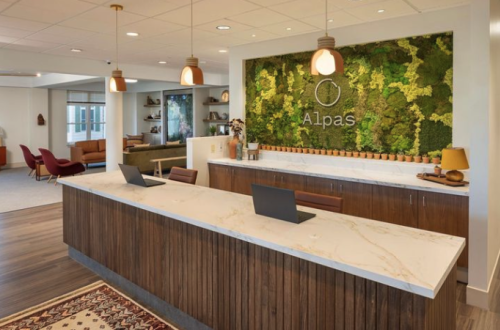
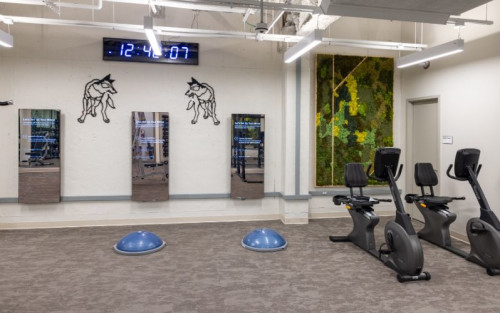
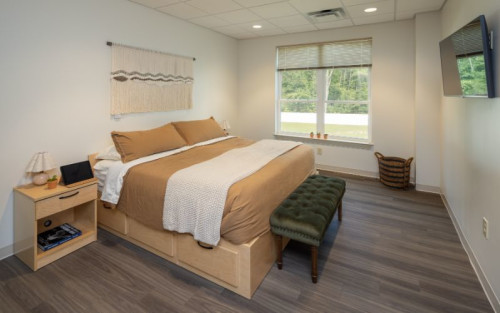
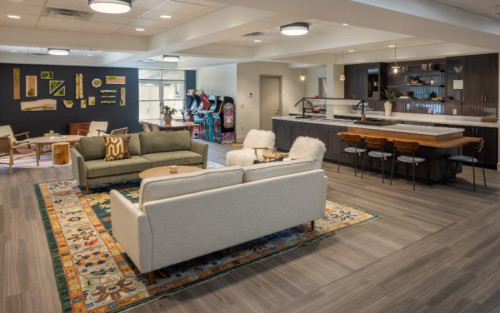




Alpas Wellness Center
Verified Center
This provider's information has been quality-checked by Recovery.com's Research Team for accuracy and completeness, including center verification through appropriate third-party organizations.
Treatment Focus
This center treats substance use disorders and co-occurring mental health conditions. Your treatment plan addresses each condition at once with personalized, compassionate care for comprehensive healing.
Primary Level of Care
Offering intensive care with 24/7 monitoring, residential treatment is typically 30 days and can cover multiple levels of care. Length can range from 14 to 90 days typically.
Treatment Focus
This center treats substance use disorders and co-occurring mental health conditions. Your treatment plan addresses each condition at once with personalized, compassionate care for comprehensive healing.
Primary Level of Care
Offering intensive care with 24/7 monitoring, residential treatment is typically 30 days and can cover multiple levels of care. Length can range from 14 to 90 days typically.
Provider's Policy
Alpas Wellness works with most insurance carriers.
Alpas Wellness Center
Alpas Wellness Center
About Alpas Wellness Center
Alpas Wellness La Plata, LLC is a medical organization with a Drug & Alcohol Treatment Centre in Charles County, Maryland. Alpas Wellness offers drug & alcohol addiction, dual-diagnosis & mental health treatment to individuals struggling with addiction issues. Named after the Tagalog word for breaking free, Alpas Wellness Center provides a continuum of personalized care for addiction recovery. Their levels of care include medically supervised detox, residential care, and aftercare. Their plant-infused facility has nursing stations on each floor, refresh spaces, and the option of private rooms.
Medically Managed Care and Evidence-Based Therapies
Alpas Wellness Center begins treatment with an initial assessment and diagnosis of co-occurring mental health conditions, if present. They use a range of holistic and evidence-based therapies to treat addiction and co-occurring conditions, including cognitive behavioral therapy (CBT), dialectical behavioral therapy (DBT), motivational interviewing techniques, experiential therapies, and contingency management. Clients receive a personalized treatment plan aligned with their diagnoses, recovery needs, and goals. Regular medical check-ups keep staff attuned to their needs.
Tailored Treatment Plans for Addiction and Dual-Diagnosis Recovery
In addition to treating addiction and dual diagnoses, Alpas Wellness Center addresses underlying medical conditions. These include diabetes, cancer, chronic pain, fibromyalgia, cardiovascular disorders, respiratory disorders, liver disease, and more. Their medical staff comprises a psychiatrist, clinical consultant, nurses, licensed practical nurses (LPNs), masters-level counselors, therapists, a physician assistant, and clinical art therapist. Nurses and an on-call physician monitor detox 24/7. Alpas Wellness Center offers medication-assisted treatment (MAT) on a case-by-case basis.
Invigorating Space to Heal
Alpas Wellness Center collaborated with the University of Pennsylvania Center for Neuroaesthetics (PCfN) to create a calming, restorative space to heal. Their naturalistic facility has a fitness center, arcade games, a café with nutritional meals and snacks, private spaces to relax, and a quiet room for biofeedback. Alpas Wellness Center’s work-flex program provides monitored access to a computer if deemed necessary. They have shared or private rooms available. Clients attend group, 1:1, and family therapy. After residential treatment, clients can participate in aftercare. Alpas Wellness Center’s aftercare services include an ongoing treatment plan with predetermined relapse-prevention strategies, emergency plans, and an app to connect with further care as needed.
Highlights from the Center
Highlights
These highlights are provided by and paid for by the center.
Insurance Accepted
Customized Treatment Plans
Holistic Approach
Medically Assisted Detox
Center Overview
Treatment Focus
This center treats substance use disorders and co-occurring mental health conditions. Your treatment plan addresses each condition at once with personalized, compassionate care for comprehensive healing.
Joint Commission Accredited
The Joint Commission accreditation is a voluntary, objective process that evaluates and accredits healthcare organizations (like treatment centers) based on performance standards designed to improve quality and safety for patients. To be accredited means the treatment center has been found to meet the Commission's standards for quality and safety in patient care.

Alpas Wellness Center
Insurance Accepted
Cash Pay Rates
Estimated Cash Pay Rate
Center pricing can vary based on program and length of stay. Contact the center for more information. Recovery.com strives for price transparency so you can make an informed decision.




Recovery.com Verified Listing
Recovery.com verified that the name, location, contact information and license to operate for this treatment provider are valid and up-to-date.

Joint Commission - Preliminary

Licensed
Recovery.com is an independent, third-party mental health resource. Verification does not imply endorsement and does not guarantee the quality of treatment services.
Meet Your Care Team

Sean Smith
Founder & CEO

Marcus Smith
Executive Director + Acting Clinical Director

Antoine Smith
LPN

Christian Lema Cadena
Facilities Director

Geneva Boone
LPN
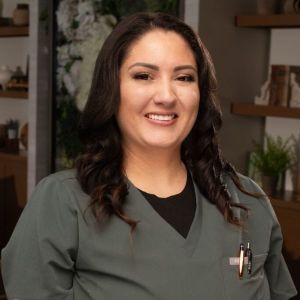
Julia Adams
RN

Kimberly Ferry-McLaughlin
Director of Admissions
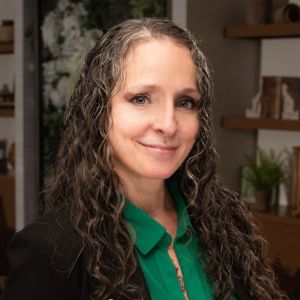
Meghan Bernier
Therapist

Patrice Covington
LPN

Tonya Lemon
Treatment Navigator

Victoria Di Pietro
Clinical Director
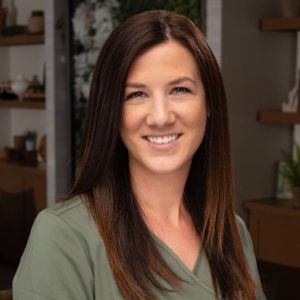
Sally Persinger
Nurse Administrator
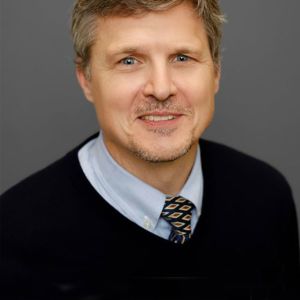
Jeffery Gall
Medical Director

David White
VP Marketing & Business Development

James Getzen
COO/CFO

Abigail Okyere-Boateng
Nurse Practitioner

Anamae Franek
LCSW-C

Jackie Crawford
Group Facilitator

Darryl Duncan
Treatment Navigator

Stephanie Melendez
Business Development Representative

Alexa Liss
Business Development Representative
Your Care Options
Specializations
Alcohol
Using alcohol as a coping mechanism, or drinking excessively throughout the week, signals an alcohol use disorder.
Detox
Detox fully and safely removes toxic substances from the body, allowing the next steps in treatment to begin with a clean slate.
Co-Occurring Disorders
A person with multiple mental health diagnoses, such as addiction and depression, has co-occurring disorders also called dual diagnosis.
Cocaine
Cocaine is a stimulant with euphoric effects. Agitation, muscle ticks, psychosis, and heart issues are common symptoms of cocaine abuse.
Drug Addiction
Drug addiction is the excessive and repetitive use of substances, despite harmful consequences to a person's life, health, and relationships.
Heroin
Heroin is a highly addictive and illegal opioid. It can cause insomnia, collapsed veins, heart issues, and additional mental health issues.
Opioids
Opioids produce pain-relief and euphoria, which can lead to addiction. This class of drugs includes prescribed medication and the illegal drug heroin.
Prescription Drugs
It's possible to abuse any drug, even prescribed ones. If you crave a medication, or regularly take it more than directed, you may have an addiction.
Who We Treat
Older Adults
Addiction and mental health treatment caters to adults 55+ and the age-specific challenges that can come with recovery, wellness, and overall happiness.
Co-Occurring Disorders
A person with multiple mental health diagnoses, such as addiction and depression, has co-occurring disorders also called dual diagnosis.
Executives
Executive treatment programs typically directly support the needs of people who manage businesses and may provide flexible schedules and office space to allow work during treatment.
LGBTQ+
Addiction and mental illnesses in the LGBTQ+ community must be treated with an affirming, safe, and relevant approach, which many centers provide.
Men and Women
Men and women attend treatment for addiction in a co-ed setting, going to therapy groups together to share experiences, struggles, and successes.
Midlife Adults
For adults ages 40+, treatment shifts to focus on the unique challenges, blocks, and risk factors of their age group, and unites peers in a similar community.
Mild Disabilities
Adults with mild physical or intellectual disabilities receive treatment catered to their specific needs in a safe and clinically supportive environment.
Treatment Services
Intensive Inpatient
The highest level of care, medically managed intensive inpatient services provides 24-hour nursing and physician care.
Detox
Detox fully and safely removes toxic substances from the body, allowing the next steps in treatment to begin with a clean slate.
Detox (on-site with residential)
This is often the first step of addiction treatment. For many people, it's dangerous to detox without proper medical support.
Residential
In a residential rehab program, patients live onsite, with access to daily treatment and 24-hour care. An average stay is 30-90 days.
Approaches
Evidence-Based
A combination of scientifically rooted therapies and treatments make up evidence-based care, defined by their measured and proven results.
Experiential
Expressive tools and therapies help patients process past situations, learn more about themselves, and find healing through action.
Holistic
A non-medicinal, wellness-focused approach that aims to align the mind, body, and spirit for deep and lasting healing.
Medical
Medical addiction treatment uses approved medications to manage withdrawals and cravings, and to treat contributing mental health conditions.
Twelve Step
Incorporating spirituality, community, and responsibility, 12-Step philosophies prioritize the guidance of a Higher Power and a continuation of 12-Step practices.
Therapies
1-on-1 Counseling
Patient and therapist meet 1-on-1 to work through difficult emotions and behavioral challenges in a personal, private setting.
Meditation & Mindfulness
A practiced state of mind that brings patients to the present. It allows them to become fully aware of themselves, their feelings, and the present moment.
Trauma-Specific Therapy
This form of talk therapy addresses any childhood trauma at the root of a patient's current diagnosis.
Online Therapy
Patients can connect with a therapist via videochat, messaging, email, or phone. Remote therapy makes treatment more accessible.
Mindfulness Therapy
This ancient practice can be mental, emotional, and even spiritual. In meditation, you focus your attention on the present moment without judgement.
Art Therapy
Visual art invites patients to examine the emotions within their work, focusing on the process of creativity and its gentle therapeutic power.
Experiential Therapy
With this approach, patients heal by doing. Therapists help patients process difficult emotions to speak, using guided activities like art or dance.
Conditions We Treat
Depression
Symptoms of depression may include fatigue, a sense of numbness, and loss of interest in activities. This condition can range from mild to severe.
Substances We Treat
Alcohol
Using alcohol as a coping mechanism, or drinking excessively throughout the week, signals an alcohol use disorder.
Benzodiazepines
Benzodiazepines are prescribed to treat anxiety and sleep issues. They are highly habit forming, and their abuse can cause mood changes and poor judgement.
Chronic Relapse
Consistent relapse occurs repeatedly, after partial recovery from addiction. This condition requires long-term treatment.
Co-Occurring Disorders
A person with multiple mental health diagnoses, such as addiction and depression, has co-occurring disorders also called dual diagnosis.
Cocaine
Cocaine is a stimulant with euphoric effects. Agitation, muscle ticks, psychosis, and heart issues are common symptoms of cocaine abuse.
Drug Addiction
Drug addiction is the excessive and repetitive use of substances, despite harmful consequences to a person's life, health, and relationships.
Ecstasy
Ecstasy is a stimulant that causes intense euphoria and heightened awareness. Abuse of this drug can trigger depression, insomnia, and memory problems.
Heroin
Heroin is a highly addictive and illegal opioid. It can cause insomnia, collapsed veins, heart issues, and additional mental health issues.
Psychedelics
Hallucinogenic drugs—like LSD—cause euphoria and increased sensory experiences. When abused, they can lead to depression and psychosis.
Languages
Aftercare
Care Designed for Your Needs
Personal Amenities
Amenities
Special Considerations
Flexible technology policies
Centers with flexible technology policies allow professionals to stay in touch with work and give patients a greater sense of connection and normalcy.
Activities
Learn More About the Center
Celebrating Alpas Wellness Center’s Opening
Southern Maryland News highlights Alpas Wellness Center opening and the impact of their services.
What to Expect in Treatment
Learn more about what to expect when starting treatment at Alpas Wellness Center.
Alpas Wellness Center’s Treatment Approach
Find out more about the patient-centered, holistic approach Alpas Wellness Center uses.
Admissions Overview
See an overview of the admissions process at Alpas Wellness Center.





